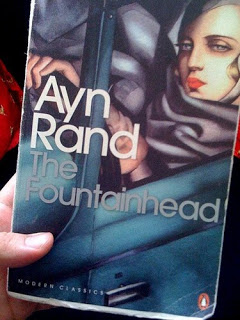
Well, this was a doozy. I keep meaning to read something by her, because she’s someone one has heard of, not so much in a literary quality way as in a slightly weird self-help kind of way. I sort of associate her with slightly overweight, long haired kind of men. I think we know who I mean.
The book tells the story of one Howard Roark, who is an architect absolutely committed to following his artistic vision. He is willing to be kicked out of school, lose jobs, lose big contracts, be reduced to penury, etc, rather than sacrifice one iota of his vision. It was in some ways quite inspiring. Her basic thesis is that everyone’s only duty is to themselves, and to be true to their view of the world. She argues that the hardest thing in the world is to do what you want to do.
She contends that religion aims to keep us under control, and that the way to do this is to keep us unhappy. It therefore teach us that self sacrifice is to be valued and admired, while she believes self-sacrifice is killing the only thing in the world that is real for us: the self. She also thinks religion aims to make us unhappy by convincing us we are wrong or evil. Roark at one point is commisioned to build a temple of all faiths, and is taken to court when he builds not a soaring monument, taking us away from ourselves and up, but something built to the scale of the human form, and celebrating the human scale.
At the end of the book, he is taken to court once again, for blowing up one of his own buildings, because it was not built exactly to his specifications. There, the people in the court are struck by the way he stands as a man ‘innocent of fear.’ They are reminded of occasions when they have suddenly thought of what they should have said in such-and-such a situation, of who they are in their minds, shining and incorruptible, before they are in real life shackled by fear. He is presented as an example of who we could be if we lived without compromise, and without need for other people.
There are some fantastic bits, like her contempt for people who would rather give money to a ‘pregnant slut’ than a ‘starving man of genius.’ Appallingly sexist, but fabulous. You get the distinct impression that Ayn Rand may have struggled as a writer for quite some time, and had to stick to her guns with some ferocity, as she is really big into the idea that you are to be judged only by how much you love your work, and how hard you stick at it, basically: don’t let the bastards get you down. There is something very freeing about her idea that success is not gauged by others’ opinions, or even by your own outer achievements, so much as it is about you holding firm in your own mind.
So, some interesting ideas. I found it a quite gripping read, which surprised me really, as the book is not exactly notable for it’s literary style. In fact, it’s kind of badly written. Coincidences abound. Cliches most definitely abound, and abound everywhere. Characters are sort of interchangable. Weirdly, given that the author is a woman, and must have been quite an exceptional woman, it’s quite sexist. It absolutely adheres to the stock style: male as centre of the plot, virgin/whores left and right, evil mother crushes genius. There is one strong-ish female character, who I strongly suspect is Ayn. But she’s devastatingly beautiful, blonde hair, blah blah. Oh yes, and she enjoys being raped, in one unforgettably weird chapter. Oh yes, my friends, the book has dated in several ways. Not least the name Howard. It’s hard to take that name seriously for the ideal man.
I think the strength of the book, what keeps pulling you in, when your good taste tells you to get out, is the fiery power with which she believes in her idea, and her desire to have you believe it too. It’s an unusual idea, and I think (viewed in the right light) an empowering one. It’s rare to come across a book that wants to change your life.
Though the above would be a good ending, I just have to say: it is kind of elitist. Also I suspect it could be used, and probably has been used, for some dubious ends. Eg. at one point she says that the whole movement of culture, away from ‘savagery,’ is a movement towards privacy for individuals. Yikes.

I read this years ago and remember being so fascinated by her vision and by these characters that seemed to just live and make life the way they thought was best. Great ideas, but i'm sure there are some problems with her philosophy which i seem to have read somewhere and then forgotten… Atlas Shrugged which is another of hers, with an even thicker number of pages is one i prefer. But thanks for pointing out the sexism and stuff. I was 16 when i read it and didn't really pick it up!